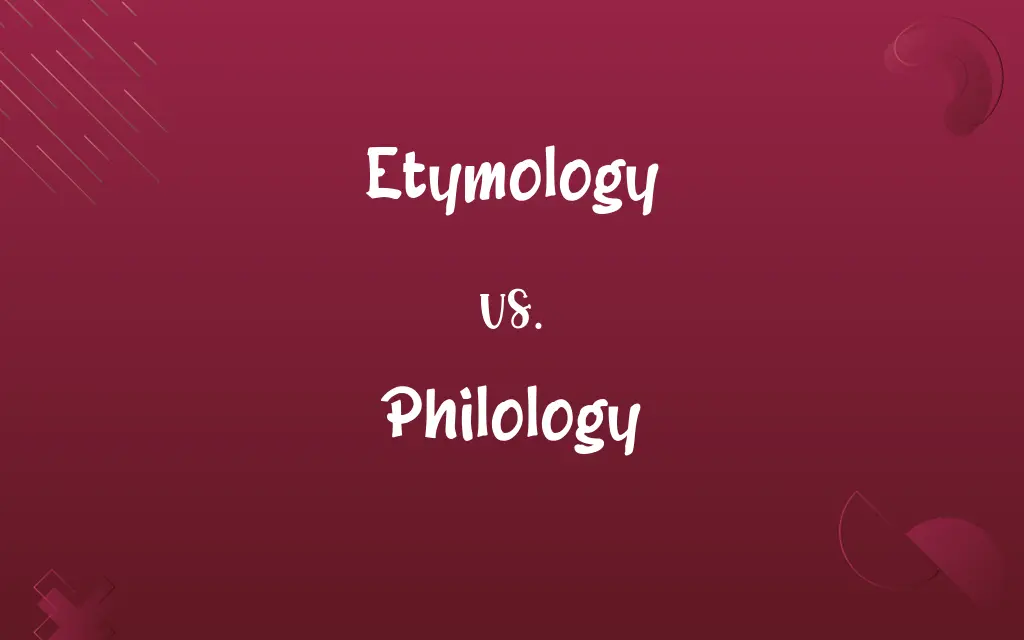Etymology vs. Philology: Know the Difference

By Shumaila Saeed || Updated on December 25, 2023
Etymology is the study of the origin and historical development of words, while philology is the broader study of language in written historical sources.

Key Differences
Etymology focuses specifically on the history and evolution of individual words, tracing their origins, changes in form, and shifts in meaning. Philology, on the other hand, encompasses a broader study of language, including its structure, history, and relationship with culture and literature.
Shumaila Saeed
Nov 13, 2023
Etymologists dissect words to understand their roots, often uncovering connections with older languages. Philologists not only study linguistic history but also analyze the cultural and societal context of language.
Shumaila Saeed
Nov 13, 2023
The study of etymology is central to understanding how languages influence each other, revealing linguistic borrowings and adaptations. Philology goes beyond words to include the study of literary texts, inscriptions, and historical documents.
Shumaila Saeed
Nov 13, 2023
Etymology is a tool in philology, providing insights into the evolution of language, but it's more focused and specific. Philology can be considered a bridge between linguistic studies and historical and literary analysis.
Shumaila Saeed
Nov 13, 2023
Both etymology and philology are crucial in understanding the dynamic nature of language, but etymology is more about word origins, while philology combines linguistic and cultural studies.
Shumaila Saeed
Nov 13, 2023
ADVERTISEMENT
Comparison Chart
Focus
Origin and history of words
Study of language and its cultural context
Shumaila Saeed
Nov 13, 2023
Methods
Analyzing word roots and evolution
Analyzing linguistic patterns in historical texts
Shumaila Saeed
Nov 13, 2023
Objective
Understanding word origins and changes
Understanding language in its historical and cultural context
Shumaila Saeed
Nov 13, 2023
Relation to Other Fields
Part of linguistic studies
Combines linguistics, history, and literature
Shumaila Saeed
Nov 13, 2023
ADVERTISEMENT
Etymology and Philology Definitions
Etymology
Etymology helps understand the semantic changes in words over time.
Nice had a very different meaning in its etymological history.
Shumaila Saeed
Nov 10, 2023
Philology
Philology is the study of language in written historical sources.
Philology uses ancient manuscripts to study historical languages.
Shumaila Saeed
Nov 10, 2023
Etymology
Etymology often involves the study of older or ancient languages.
Etymology frequently references Latin and Greek origins.
Shumaila Saeed
Nov 10, 2023
Philology
Philology includes the analysis of texts, words, and their evolution.
Philologists study changes in language through Shakespeare's works.
Shumaila Saeed
Nov 10, 2023
Etymology
Etymology uncovers the historical journey of words across languages.
The etymology of alcohol reveals its Arabic origin.
Shumaila Saeed
Nov 10, 2023
ADVERTISEMENT
Philology
Philology involves reconstructing ancient languages and texts.
Philology has helped reconstruct the sounds of Old English.
Shumaila Saeed
Nov 10, 2023
Etymology
The origin and historical development of a linguistic form as shown by determining its basic elements, earliest known use, and changes in form and meaning, tracing its transmission from one language to another, identifying its cognates in other languages, and reconstructing its ancestral form where possible.
Shumaila Saeed
Oct 19, 2023
Philology
Philology combines linguistic, literary, and cultural studies.
Philology can reveal how language shapes cultural narratives.
Shumaila Saeed
Nov 10, 2023
Philology
Philology helps understand the historical context of linguistic changes.
Philology shows how historical events influenced language development.
Shumaila Saeed
Nov 10, 2023
Etymology
The study of the historical development of languages, particularly as manifested in individual words.
Shumaila Saeed
Oct 19, 2023
Etymology
(countable) The origin and historical development of a word; the derivation.
Although written the same, the words lead (the metal) and lead (the verb) have totally different etymologies.
Shumaila Saeed
Oct 19, 2023
Etymology
(countable) An account of the origin and historical development of a word as presented in a dictionary or the like.
Shumaila Saeed
Oct 19, 2023
Etymology
That branch of philological science which treats of the history of words, tracing out their origin, primitive significance, and changes of form and meaning.
Shumaila Saeed
Oct 19, 2023
Etymology
That part of grammar which relates to the changes in the form of the words in a language; inflection.
Shumaila Saeed
Oct 19, 2023
Philology
(philosophy) Love and study of learning and literature, broadly speaking.
Shumaila Saeed
Oct 19, 2023
Philology
(culture) Scholarship and culture, particularly classical, literary and linguistic.
Shumaila Saeed
Oct 19, 2023
Etymology
Etymology is the study of word origins and their evolution.
The etymology of chocolate traces back to the Aztec word xocolātl.
Shumaila Saeed
Nov 10, 2023
Philology
The study of language, especially in a philosophical manner and as a science; the investigation of the laws of human speech, the relation of different tongues to one another, and historical development of languages; linguistic science.
Shumaila Saeed
Oct 19, 2023
Etymology
Etymology involves analyzing the roots and transformations of words.
Etymology explains how knight once meant servant.
Shumaila Saeed
Nov 10, 2023
Repeatedly Asked Queries
What does philology encompass?
Philology encompasses the study of language, including its history, literature, and cultural context.
Shumaila Saeed
Nov 13, 2023
What is etymology?
Etymology is the study of the history and origin of words.
Shumaila Saeed
Nov 13, 2023
How do etymologists trace word origins?
Etymologists trace word origins by examining linguistic roots and historical usage.
Shumaila Saeed
Nov 13, 2023
Is philology just about ancient languages?
While philology often involves ancient languages, it also covers modern languages and their historical contexts.
Shumaila Saeed
Nov 13, 2023
Is etymology used in language learning?
Yes, etymology can be a useful tool in understanding and remembering new words in language learning.
Shumaila Saeed
Nov 13, 2023
Can philology include the study of literature?
Yes, philology often includes the study of literature and how it reflects and shapes language.
Shumaila Saeed
Nov 13, 2023
Does etymology focus on the meaning of words?
Etymology primarily focuses on the origin and historical development of word meanings.
Shumaila Saeed
Nov 13, 2023
Can etymology reveal language connections?
Yes, etymology can reveal connections between different languages.
Shumaila Saeed
Nov 13, 2023
How does philology contribute to cultural studies?
Philology contributes to cultural studies by interpreting linguistic patterns in historical and cultural contexts.
Shumaila Saeed
Nov 13, 2023
What's the importance of philology?
Philology is important for understanding the evolution and cultural significance of language.
Shumaila Saeed
Nov 13, 2023
Do etymologists study word pronunciation?
Etymologists may study historical pronunciation as part of understanding a word's evolution.
Shumaila Saeed
Nov 13, 2023
Are new words studied in etymology?
New words can be studied in etymology to trace their origins and entry into a language.
Shumaila Saeed
Nov 13, 2023
How does philology relate to history?
Philology relates to history by analyzing how languages and texts reflect and influence historical contexts.
Shumaila Saeed
Nov 13, 2023
What skills do philologists need?
Philologists need skills in linguistics, historical analysis, and often proficiency in multiple languages.
Shumaila Saeed
Nov 13, 2023
What is a philological approach to texts?
A philological approach to texts involves analyzing language, historical context, and literary significance.
Shumaila Saeed
Nov 13, 2023
Can etymology help with vocabulary building?
Understanding etymology can aid in vocabulary building by revealing the roots and connections of words.
Shumaila Saeed
Nov 13, 2023
Does etymology play a role in dictionary creation?
Yes, etymology plays a crucial role in explaining word histories and origins in dictionaries.
Shumaila Saeed
Nov 13, 2023
Are philologists interested in spoken language?
Philologists are interested in both spoken and written language, though their primary sources are often written texts.
Shumaila Saeed
Nov 13, 2023
How does etymology affect modern language?
Etymology affects modern language by showing the origins and evolution of contemporary words.
Shumaila Saeed
Nov 13, 2023
Is philology a multidisciplinary field?
Yes, philology is a multidisciplinary field, intersecting with linguistics, history, and literary studies.
Shumaila Saeed
Nov 13, 2023
Share this page
Link for your blog / website
HTML
Link to share via messenger
About Author
Written by
Shumaila SaeedShumaila Saeed, an expert content creator with 6 years of experience, specializes in distilling complex topics into easily digestible comparisons, shining a light on the nuances that both inform and educate readers with clarity and accuracy.









































































